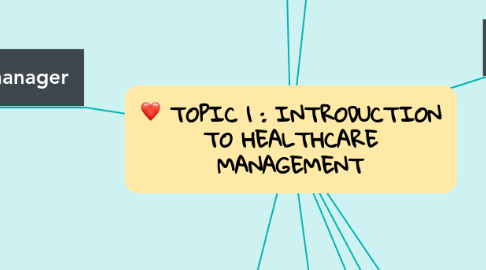
1. Definition management
1.1. -
1.2. -
1.3. the process, comprised of social and technical functions and activities occurring within organizations
2. Domains of health services administration
2.1. Managers consider external and internal domains to carry out task and make decisions.
2.1.1. -
2.1.2. External domains-influences, resources and activities
2.1.2.1. -
2.1.2.2. Community need
2.1.2.3. Accreditation
2.1.2.4. Licensure
2.1.3. Internal domains-areas of focus
2.1.3.1. Staffing
2.1.3.2. Budgeting
2.1.3.3. Quality services
2.2. -
3. Role of manager
3.1. Interpersonal roles
3.1.1. Leader
3.1.1.1. Responsible for the motivation and direction
3.1.1.2. Example:virtually all managerial activities
3.1.2. Liason
3.1.2.1. Maintain a network of outside contacts
3.1.2.2. Example:acknowledgement of mail, external/board work.
3.1.3. Figurehead
3.1.3.1. Symbolic head, required to perform a number of routine duties
3.1.3.2. Example:ceremonies, status request, solicitations
3.2. Informational roles
3.2.1. Monitor
3.2.1.1. Receives wide variety of information
3.2.1.2. Example:handing all mail and contacts
3.2.2. Disseminator
3.2.2.1. Transmit information received from outsiders or other subordinates
3.2.2.2. Example:forwarding mail into organization for information purposes
3.2.3. Spokesperson
3.2.3.1. Transmit information to outsiders on organization’s plans, policies, actions, and results
3.2.3.2. Example:handling contacts involving transmission of information to outsiders
3.3. Decisional roles
3.3.1. Entrepreneur
3.3.1.1. Searches organization and its environment for opportunities and initiates projects
3.3.1.2. -
3.3.1.3. Example:srategy and review sessions
3.3.2. Disturbance handler
3.3.2.1. Responsible for corrective action
3.3.2.2. Exampe:strategy and review sessions involving disturbances and crises
3.3.3. Resources allocator
3.3.3.1. Making or opproving significant organizational decisions
3.3.3.2. Example:scheduling; request for authorization; budgeting, the programming of subordinates work
3.3.4. Negotiator
3.3.4.1. Responsible for representing the organization.
3.3.4.2. Example:contract negotiation
4. -
5. Functions of management
5.1. Planning
5.1.1. Manager set a direction and determine what needs to be accomplished.
5.1.2. Setting priorities.
5.1.3. Determining performance target.
5.2. Organizing
5.2.1. Overall design of the organization/division/unit
5.2.2. Determining positions, teamwork assignments, and distribution of authority and responsibility.
5.2.3. Designating reporting relationship and intentional patterns of interaction.
5.3. Staffing
5.3.1. Developing and maintaining the workforce
5.3.2. Refers to acquiring and retaining human resources.
5.4. Directing
5.4.1. Initiating action in the organization through effective leadership and motivation
5.5. Controlling
5.5.1. Taking appropriate actions to increase performance.
5.5.2. Monitoring staff activities and performance.
5.6. Decision making
5.6.1. Make effective decision
6. Key competencies of manager
6.1. Conceptual skills
6.1.1. Ability to critically analyzed and solve complex problem.
6.1.2. Example: manager conduct an analysis of the best way to reduce patient complaints.
6.2. Technical skills
6.2.1. Ability to perform a specific work task.
6.2.2. Example: manager develop and implement a new incentive compensation program for staff.
6.3. Interpersonal skills
6.3.1. -
6.3.2. Skills that enable manager to communicate with.
6.3.3. Example: manager counsels an employee whose perform below expectation managed to performed up to desired performance level for the next year.

